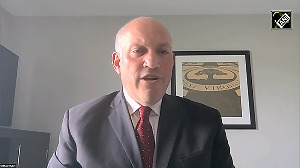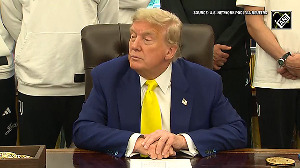One of India's highest funded institutions of higher learning and research, the Aligarh Muslim University, appears in the media more often than not for the wrong reasons, for which the onus lies more on the AMU administration. But the Union government is equally responsible. Much is being talked about reforming, streamlining and revolutionising higher education. The pathetic state of affairs in AMU, and the government inaction against corruption and irregularities in the university system, despite clinching evidence, is disgusting.
In February, a 64-year-old senior faculty member was suspended. He was going to retire in the next few months. Complying with the orders of the AMU administration, he has not only vacated the AMU residential accommodation, but also reportedly left Aligarh for good.
While the AMU's 'show-cause notice' alleges that he indulged in 'gross misconduct', there are reports that he had indulged in homosexuality -- in his private space and with the consent of his partner. How did the administration get the evidence? It reportedly sent a 'student' to do a 'sting operation', got video clips and gave it to the AMU administration which showed greatest alacrity in taking action. While suspending a proud and reputed faculty member, the AMU chose to ignore the fact that less than a year earlier the Delhi high curt had decriminalised homosexuality.
Insiders will reveal that the law of the land is immaterial for the university, and religious codes are the only relevant reference. A modern university funded by a secular democratic State is run not in accordance with the law, but according to the Sharia.
But it should be noted that the 'minority' university also persecutes its own minority. The victim professor carried various layers of minority identities which might have made him vulnerable. In addition to his alleged sexual orientation, he is a Hindu on a Muslim majority campus; Marathi-speaking among the Urdu-Hindi speaking; and he taught Marathi literature in the department of modern Indian languages, the faculty of arts. He was also the chairman (head) of the department. Due to the suspension, he will no longer be a member of the selection committee of the teachers which will be held in a week or so. Many people link his suspension with the 'politics of the selection committee'.
A research student who is more vociferous in the media against the professor, even while indulging in various kinds of politicking in AMU, is alleged to have had a hand in the breaching of the professor's privacy and making the video-clip available to the administration. Did the AMU administration hire him for the purpose? There are whispers in the affirmative.
Many leading English newspapers and television channels have expressed outrage at the professor's suspension. What is most intriguing is that AMU insiders who stand for liberal, secular, leftist values have maintained a conspicuous silence. It includes someone who is a globally renowned social scientist and a card-carrying member of the Communist Party of India-Marxist. Why? Is it because the incumbent vice chancellor has 'doled out a favour' to him by making him emeritus professor which he most certainly deserved but was denied for over one and a half decades, because of the petty politics of revenge? Many insiders don't deny such a possibility.
Another pertinent thing about the whole episode is the alacrity with which action against homosexuality was executed. The AMU is essentially a kind of university where indiscipline, corruption, illegal recruitments/promotions and every other kind of irregularity are tolerated and even promoted. In 2007, but only after much struggle by RTI activists, the Justice Mathew Committee Report of 1998 was made public. It catalogues all kinds of irregularities during the 1990s. Despite much outcry, no action was taken against those indicted in the report.
In April 1998, two lecturers in the department of political science were recruited in gross violation of eligibility conditions. In a similar case, a Delhi court terminated the job of a lecturer of mathematics in a Delhi University college. The AMU, far from removing such lecturers, promoted one of them. He has since been taken into the AMU's administration also. This teacher is in the 'media committee' of the AMU, which is meant to spruce up the incumbent VC's image.
Various communications from the University Grants Commission have warned the AMU's finance department for having indulged in gross financial irregularities. But the UGC (once described as a 'toothless tiger') is a wonderful body; it doesn't/can't penalise the functionaries even if it has clinching evidence. AMU employees have not been paid at least 15 percent of the arrears of the Sixth Pay Commission, because the fund has reportedly been withheld by the UGC in 'retaliation' for the irregularities.
If that is really the UGC's argument then it is laughable. AMU employees are being penalised for the fault of the office of the finance department. The teachers' association and associations of other employees are maintaining complete silence on this. Interestingly, the secretary of the teachers' association, till recently, was also a member of the AMU's executive council, which with 26 members is practically the highest decision-making body of the university.
Of these 26 members, four are directly elected by the teachers. The EC is empowered to empanel five names to be appointed as the vice chancellor (five-year tenure). These five names are then put to vote by 200-odd members of the AMU court, who send three of these names to the Visitor (the President of India) who appoints one as the VC. The Visitor exercises his/her power through the ministry of human resource development.
In April-May 2007 when this exercise of empanelment of the VC was going on, the most preferred candidate, Professor Abdul Azis, had already hit the headlines in the English media with various kinds of allegations like his poor academic record, plagiarism in research, illegality of his recruitment as (or promotion to) professor, and financial corruption in the capacity of the vice chancellor of the Cochin University of Science and Technology.
The government of Kerala subsequently charge-sheeted Prof Azis for many such irregularities. But the AMU's decision-makers preferred to ignore these reports, and recommended his name and he was appointed to the top job. Information obtained through RTI revealed that financial mishandling continues unabated in the AMU.
But very soon the forerunners who were overenthusiastic in empanelling him fell out and worked hard to pressurise the government to institute an inquiry into the allegations of financial irregularities. The VC also worked hard to pre-empt the inquiry. He prepared a dossier of murky past records of his opponents and sent it to the Visitor for her perusal. But all went in vain; Justice Fakhruddin and A H Jung were appointed to inquire. For some reasons (including non-cooperation from the AMU administration), the inquiry failed to submit its report and another inquiry committee under Justices Basiruddin and Akbar Debacha has been re-instituted (February 2010).
Why did the 'gang' oppose the VC when they had empanelled him? Have they fallen out because of being denied a share in the alleged loot? Neutral and objective insiders and faculty members, who are unconcerned with the 'murky' power games within the AMU, readily say, 'yes'. This 'gang' usually manages to get into the executive council and the AMU court. At the moment, two prominent 'gangs' are operating in AMU, one is up against the VC, the registrar, and the finance officer. Another 'gang' is led by the incumbent finance officer and whose husband's brother is a professor and a member of the executive council, and a staunch defender of the VC. His residence in the campus remains studded with employees wishing to get favours of promotions and lucrative responsibilities.
Recently, a number of AMU officers (non-teaching) were transferred. One such officer (deputy registrar) was transferred thrice in a year. The high-ranking officer was posted to look after a polytechnic, which is otherwise looked after by a section officer. Perhaps, the VC's secretariat has a surplus of high officers.
The inefficiency of the administration is testified by the fact that no plan proposal has yet been prepared, hence the allocation of Rs 50 crore remains unclaimed for the off-campuses of AMU to be opened in Murshidabad (West Bengal) and Mallapuram (Kerala). Many expensive trips to Mallapuram (also home town of the VC and registrar), however, have been made, on the pretext of expediting it.
The AMU alumni run a large number of group e-mail networks, subscribed by over 10,000 people spread across the globe who discuss every big and small issue of their alma mater. In these mails they have expressed their disgust against all these irregularities.
The Visitor, HRD Minister Kapil Sibal and even the prime minister have all been apprised of the murky affairs in the AMU. Sibal keeps shouting about streamlining governance within universities, but he has not asked the AMU functionaries to proceed on leave during the judicial inquiry. Many Muslim organisations and leaders (religious and modern-secular) have openly offered their support to the VC.
The AMU is being projected as similar to Muslim personal law, in which the Indian State, according to religious conservatives, should not be allowed to intervene. Religious conservatives often get active State support. They have tasted victory in the Shah Bano case (1986). Perhaps, this is what the Sangh Parivar calls as 'appeasement'. Is it really an appeasement of Indian Muslims, or mere State support to the conservative, corrupt, and self-serving elites among Muslims?
The writer, a senior faculty member of AMU, has preferred to remain anonymous








